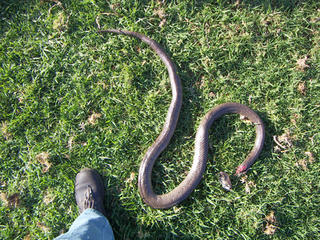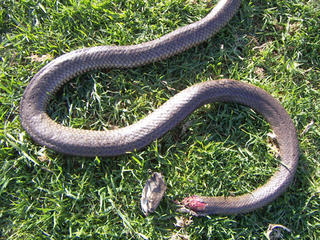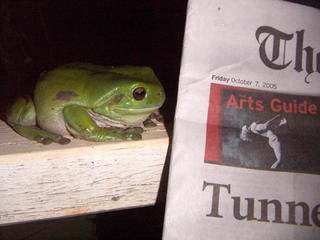Erasing the law
JOSH DRATEL (Hicks' civilian attorney): [David Hicks was chosen as one of the first Guantanamo inmates to face a military commission because he] allows for the process to look even-handed in a cultural and ethnic sense. He's a Caucasian, he's a westerner. "This is not about the Middle East. This is not about, you know, people of colour. This is about dangerous people." So, they can say that and... and also I think that he's English speaking, and they would like to if they, if they could... turn him against others, and have a witness, that would be to their advantage.
DEBBIE WHITMONT: How many other Caucasian Guantanamo detainees are there now, to your knowledge?
JOSH DRATEL: Zero.
Also:
MAJOR MICHAEL (DAN) MORI (Hicks' military attorney): Mr Howard's not saying David violated any law. Why? Because David hasn't violated a law.
Also:
LIEUTENANT COMMANDER CHARLES SWIFT (military attorney, representing Salim Ahmed Hamdan): I believe that there is a desire to have justice for 9/11 and other crimes. The victims are owed that, absolutely, they are owed that. The American society is owed that. But for whatever reason, we're not willing to use the tried and true instruments of justice in this case. Justice, you know, when you don't have law, what you've got is revenge.
And further from Lt Cdr Swift, from a transcript of interview:
Q. What were your immediate concerns about the [military commission] system?
A. It has no, it has no independence. It does not base itself on either international law or military law. It is solely a system created by the President who looks at it as his ability to decide the law, to decide who gets charged and to ultimately decide whether they’re guilty or not. A system like that wherein you put all the power in one branch of government - and western governments understand that you must divide power, no matter how good the intentions or the people, there is too much temptation and too much rationalisation. And at its heart the problem with this military commission is it’s not based in law, it’s based in presidential or executive discretion. And you could see that really in the first few statements that were made was we’re counting on people, you know, the people will deliver a fair trial. Well, in western democracies the law delivers a fair trial. We don’t depend on people, we depend on the law. And so from its inception this case, these commissions, have not been based on anything that resembles either international law or military law.
And this:
[Regarding inmates' statements given as evidence] Of course we presume them to be coerced. They also have to understand that the effect, the most basic coercion of all is Guantanamo itself. Everywhere there are posters that say confess and go home.
Q. Is that right, in Guantanamo?
A. Absolutely, in Arabic. They are really interesting. Several of them are interesting where they show a woman going to old age and it points out that she’s growing old without you. Now in Guantanamo you’re guilty until you prove you’re innocent and if, they say you have to confess to get out.
And this:
Law can’t exist only for one side. One of the things that strikes me is the definition of combatant. ‘Anyone who provides any material support whatsoever is a combatant’, the example by, in the Federal Court, Judge Joyce Hens Green, who I think got an answer she never expected was, if a little old lady gives, you know, money to a charity which in turn uses it for al Qaeda, is she a combatant? Yes.
Q. That was the answer given?
A. Yes. Now that’s terrifying and not for the reason you think about, because that definition also has to define combatants on our side. That was the definition of World War II. … That’s why you could bomb cities. That’s why you could fire bomb Dresden, they’re all combatants. They are materially supporting the German Army. You can drop a nuclear bomb on Hiroshima because they’re materially supporting. London can be fire bombed. It’s all okay, you do not have attack the army... So we are shifting to a definition that was rejected by the civilized world in 1950. In 1949 and 1950 we said never again. We looked at the charred ruins of Europe and said, no, we will not attack civilians. There is a distinction between someone who supports an army and some one who actually fights. This distinction is being erased in international law, where the United States seeks to erase it, and the absolute irony is we’re the ones who led the distinction.







 Independent yet still part of a large community, frogs are unique creatures known for their distinctive sound and ability to hop. As a frog, you spend your days sitting on lily pads or climbing trees, searching for delicious insects to eat. While there are some frogs that aren't exactly cute, you are certainly not one of those!
Independent yet still part of a large community, frogs are unique creatures known for their distinctive sound and ability to hop. As a frog, you spend your days sitting on lily pads or climbing trees, searching for delicious insects to eat. While there are some frogs that aren't exactly cute, you are certainly not one of those!

